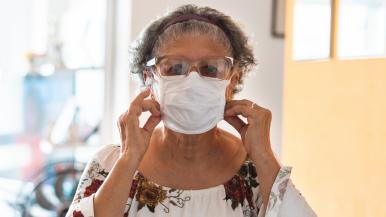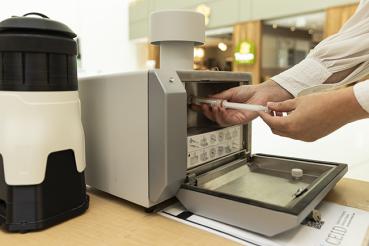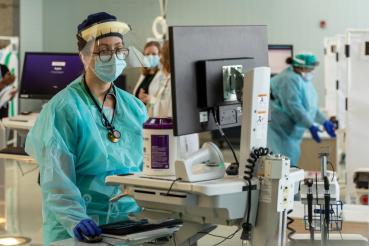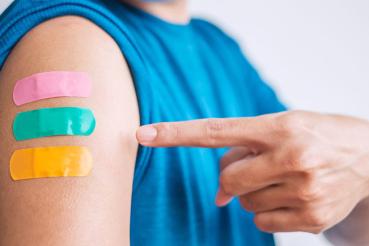Rush infectious disease expert Michael Lin, MD, discusses what you need to know about face masks — including why they remain an important measure of protection even as more people get the COVID-19 vaccine, how well different types of masks work and situations where it’s essential to wear one.
The importance of face masks during COVID-19
While social distancing, hand hygiene and the COVID-19 vaccine are all key to preventing the spread of the novel virus COVID-19, face masks are another important tool. They help us protect the people around us from the respiratory droplets produced when we cough, sneeze, talk, shout or sing.
In fact, research shows that even a cotton mask can dramatically reduce the number of virus particles emitted from our mouths — by as much as 99%.
“Wearing a face mask and maintaining social distancing are especially important now, as people are allowed to gather in small groups, and schools and indoor dining reopen in many places,” Lin says. “We have seen that outbreaks tend to arise from gatherings where people are in close proximity in enclosed spaces.”
The U.S. Centers for Disease Control and Prevention advises the use of face coverings to slow the spread of the virus, and to help people who may have the virus and are not aware they’re transmitting it to others. Recent studies have shown that nearly half of COVID-19 patients are infected by people who aren’t coughing or sneezing yet, or a pre-symptomatic spread.
“‘I protect you, you protect me,’” Lin says. “This is the rationale for people to wear face masks.”
‘I protect you, you protect me.’ This is the rationale for people to wear face masks.
The CDC also recommends that anyone over the age of 2 should wear a face covering in public settings where social distancing measures are difficult to maintain.
“Face mask etiquette is so important,” says Lin, who offers these guidelines:
- Be disciplined about keeping the mask on when you are within 6 feet of another person.
- Make sure the mask covers both your nose and mouth.
- Use hand hygiene before and after touching the mask, so you are not potentially spreading virus particles on the mask to your hands and then to nearby surfaces.
- Do not pull down the mask when you are talking to someone nearby. “That’s actually when the mask is most needed,” Lin says.
The types of face masks
When choosing a face mask, there are many types. The most common are hospital-grade and cloth, and each provides a different level of protection against the airborne coronavirus.
- A hospital-grade face mask, such as surgical or N95, provides protection for the person wearing the face mask. Recent research indicates that surgical masks can also decrease the amount of particles of the virus people produce by breathing and talking.
- A homemade, or cloth, face mask may not provide the same assurance as a hospital-grade mask because of the inconsistency of the product. Homemade masks are often made of cotton material, which may not protect you from inhaling particles that carry the virus. Cloth masks can, however, keep you from potentially spreading the virus to others.
“At Rush, we require everyone to wear hospital-issued face masks while on campus,” Lin says. “Every time you enter the hospital — whether as a patient or employee — you will be given a new face mask for safety.”
Although a hospital-grade face mask is more protective, the CDC does not recommend them for the public because widespread use would threaten the supply for both front-line health care workers and the most vulnerable populations.
When to wear a mask during COVID-19
Whether or not you’re experiencing symptoms of COVID-19, you should wear a face mask whenever social distancing is difficult to maintain. That doesn’t necessarily mean you have to wear a mask everywhere you go, just in places where people congregate, such as family gatherings, offices and retail spaces.
“We’ve seen many examples of outbreaks involving family members who are visiting each other’s households,” Lin says. “So, wearing a face mask when visiting other’s homes, even if they are immediate family, is important.”
The Illinois Department of Public Health provides other situations when it’s recommended and, in some cases, required to wear a face mask:
- Shopping at essential businesses, such as grocery stores or pharmacies
- Visiting your health care provider
- Picking up food from the drive thru or curbside pickup
- Traveling on public transportation
- Interacting with customers, clients or co-workers at essential businesses
- When feeling sick, coughing or sneezing
According to the IDPH, for some activities a face mask is not needed, assuming you’re alone or with members of your household. These include outdoor exercise and activities, and yard work on your own property.
“In general, as long as you can maintain social distance, a face mask is not necessary for outdoor activities,” Lin says. “The reason is that brief outdoor interactions are not considered high-risk for transmitting COVID-19.”
I've received the COVID-19 vaccine. Do I still need to wear a face mask?
For the time being, yes.
Even though the vaccines are very effective, particularly at preventing severe COVD-19 and death, they’re not 100% effective at preventing people from getting sick.
We also don’t know if they prevent vaccinated people from transmitting the virus to others. So it’s possible for someone who’s vaccinated to be infected but not have symptoms and unknowingly pass on the virus to someone else.
Therefore, we need to keep wearing masks and distancing until most of the population has been vaccinated and we achieve herd immunity.
“We must continue to be cautious in our actions to prevent future outbreaks," Lin says. "By practicing social distancing, getting vaccinated when it's our turn and being thoughtful about wearing face masks, we can help to keep each other, and our communities, safe from COVID-19.”




